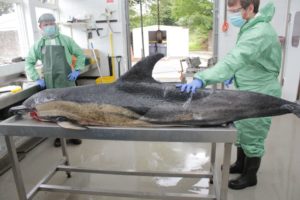 The Irish Whale and Dolphin Group (IWDG) have been working in collaboration with the Regional Veterinary Laboratories of the Department of Agriculture (RVL) and the Galway-Mayo Institute of Technology (GMIT) to carry out a cetacean post-mortem scheme on behalf of the Marine Institute and the National Parks and Wildlife Service. Utilising the IWDG’s well established strandings scheme which began in 1991, submitted stranding records of animals which fit the project criteria (i.e. good-moderate condition, target species) are collected and brought to the RVL in Cork City for examination by a qualified veterinarian in order to determine cause of death. The aim of the project is to conduct standardized laboratory necropsies of a targeted number of common and striped dolphins, as well as harbour porpoises. From these necropsy examinations, veterinarians from the RVL with the aid of biologists from GMIT and the IWDG generate detailed case history reports for each animal documenting details of the animals initial examination, as well as the results of any tests such as bacteriology and histology and any other significant findings. The UK CSIP at the IoZ, London has provided the team with expert training and technical guidance, and is also providing independent oversight on the case histories generated from all necropsies. Samples collected during the necropsies will be stored and may be used to facilitate a variety of future investigations of marine mammal ecology. This is Ireland’s first post-mortem scheme which aims to establish cause of death, and has the potential to greatly increase our understanding of the cause of strandings, as well as provide samples to explore the health and ecology of cetaceans in Ireland.
The Irish Whale and Dolphin Group (IWDG) have been working in collaboration with the Regional Veterinary Laboratories of the Department of Agriculture (RVL) and the Galway-Mayo Institute of Technology (GMIT) to carry out a cetacean post-mortem scheme on behalf of the Marine Institute and the National Parks and Wildlife Service. Utilising the IWDG’s well established strandings scheme which began in 1991, submitted stranding records of animals which fit the project criteria (i.e. good-moderate condition, target species) are collected and brought to the RVL in Cork City for examination by a qualified veterinarian in order to determine cause of death. The aim of the project is to conduct standardized laboratory necropsies of a targeted number of common and striped dolphins, as well as harbour porpoises. From these necropsy examinations, veterinarians from the RVL with the aid of biologists from GMIT and the IWDG generate detailed case history reports for each animal documenting details of the animals initial examination, as well as the results of any tests such as bacteriology and histology and any other significant findings. The UK CSIP at the IoZ, London has provided the team with expert training and technical guidance, and is also providing independent oversight on the case histories generated from all necropsies. Samples collected during the necropsies will be stored and may be used to facilitate a variety of future investigations of marine mammal ecology. This is Ireland’s first post-mortem scheme which aims to establish cause of death, and has the potential to greatly increase our understanding of the cause of strandings, as well as provide samples to explore the health and ecology of cetaceans in Ireland.
Stephanie Levesque, Cetacean Necropsy Scheme Project Coordinator